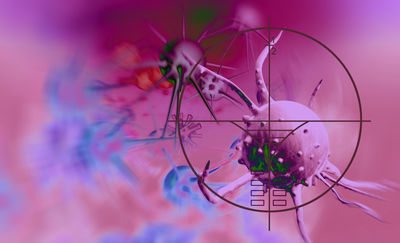News & Events

Scientists have found a way to reprogram cancer cells into healthy ones
Cancer cells are continuously appearing in the body, but the natural anti-tumor defense gets rid of them. Cancer occurs when the immune system does not recognize the appearance of a cancer cell and it starts divide uncontrollably, developing into a tumor. Findings of the new study by specialists of Mayo Clinic published in the Nature Cell Biology suggest that this code can be reprogrammed to make cancer cells normal again, Mednovosti.ru reports.
Cancer cells are continuously appearing in the body, but the natural anti-tumor defense gets rid of them. Cancer occurs when the immune system does not recognize the appearance of a cancer cell and it starts divide uncontrollably, developing into a tumor. Findings of the new study by specialists of Mayo Clinic published in the Nature Cell Biology suggest that this code can be reprogrammed to make cancer cells normal again, Mednovosti.ru reports.
Panos Anastasiadis, professor in oncobiology from Mayo, said that the finding represents “an unexpected new biology that provides the code, the software for turning off cancer.” The subject of the study was the role of adhesion proteins (the glue that keeps cells together to form tissue) and how they interact with microRNAs (miRNAs) – noncoding RNA molecules involved in the regulation of gene expression. In groups of normal cells, special microRNAs repress genes that promote cell division and cell growth. However, this growth becomes uncontrollable in case of tumor cells. The researchers found that when they restored signals of microRNAs in cancer cells, they ceased to grow uncontrollably.
With regard to the adhesive proteins — E-cadherin and catenin p120 — there were conflicting scientific data: a long time it was thought that they inhibit tumor growth, but both molecules can be found in tumors and play role in their growth. This raised the question that the molecules actually have "two faces" — the "good" one helping normal cells to behave correctly, and the "bad" one stimulating tumor growth. For a while it remained unclear what determines the switch of functions. The answer was a protein called PLEKHA7 binding to E-cadherin and p120. If it is absent, the regulation of microRNAs is impaired and E-cadherin and p120 become stimulants of tumor growth. This means that PLEKHA7 acts as a brake pedal.
Professor Anastasiadis believes that it is a mechanism universal for all types of cancer and it works in the earliest stages. In the vast majority of human tumor samples the same pattern was observed, namely, E-cadherin and p120 "without brakes", i.e. without PLEKHA7 complex. In laboratory experiments, the researchers were able to restore normal cell function and stop the division by affecting on miRNA in the cells of several types of aggressive cancers. This could be a new strategy for cancer therapy, although it is not even tested in preclinical trials.
Original text: http://medportal.ru/mednovosti/news/2015/08/25/735mayo/














